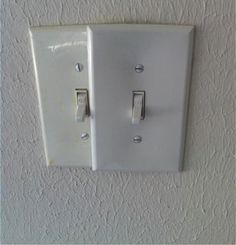8 Bad ‘Home Improvement’ Habits from RealtorMag
Home owners can overdo it when it comes to the upkeep of their home. This Old House recently spotlighted several ways that home owners’ enthusiasm for home ownership may actually harm the house.
1. Having light bulbs that are too bright. You want a well-lit home, but exceeding a lamp or light fixture’s recommended wattage can be dangerous, particularly with incandescents or halogen lights, says John Drengenberg, consumer safety director for Underwriters Laboratories. “Using a bulb with too-high wattage will cause the fixture and its wiring to overheat,” he notes, which could then allow the heat to travel to the wall or erode the insulation on the wires and lead to a house fire. Check the fixtures label to make sure you use the correct wattage.
2. Planting trees near driveways or walkways. A line of trees to the house may up its curb appeal but adding young trees near driveways or walkways could be putting your slab at risk. As these trees grow taller, their roots will go outward, potentially pushing up the paving and causing it to buckle or crack. This Old House recommends planting small trees that will remain under 20 feet at maturity and that are at least 10 feet from paved areas. For larger trees, leave at least a 20-foot radius.
3. Overscrubbing a sink. Don’t overdo it with abrasive cleaners; they can scratch the sink. “Cleaners with a grit or grain to them will wear away at the finish and dull it,” Kohler‘s Mike Marbuch told This Old House. “That will make the sink more prone to gunk sticking to it—actually making it look dirtier.” Try a liquid cleanser like vinegar or lemon juice on the sink and avoid scrubbing it every day.
4. Overdoing it with can lights. Excessive recessed lighting in a home can cause a lot of air leaks. Recessed lighting is known as causing heat-sucking air leaks, especially when the fixtures are unsealed in vaulted ceilings. Airtight recessed lighting fixtures are available that are rated for insulation contact (IC). Also, use as few recessed lights as you can, especially when it comes to adding them to cathedral ceilings or in rooms directly below unconditioned attics.
5. Spreading too much mulch outside. “Over-mulching will suffocate plants, confuse their root systems, and prevent water from percolating into the soil,” notes the article at This Old House. “If you’ve mulched so much that tree trunks and flowers’ and shrubs’ lower branches are covered by or dragging in it, you’ve gone overboard.” Have mulch no thicker than 3 inches.
6. Using glass cleaner on mirrors. Watch out for store-bought sprays that promise to make your glass sparkle. “A drop of liquid running around the mirror’s edge can cause the reflective backing to lift or craze,” This Old House notes. The black edge can occur from using ammonia- or vinegar-based cleaners. This Old House recommends using warm water and a soft, lint-free cloth to clean mirrors. Or if you do use the sprays, spray it onto a dry cloth first and not directly onto the glass.
7. Repainting too much. “Excessive paint is detrimental – especially on an older house, which may have layers of thicker oil-based paint, which becomes brittle with age,” notes This Old House. To avoid thick, cracked, or peeling paint, be sure to carefully power-wash prior to painting, sand areas that need it, and then use 100 percent acrylic-resin exterior paint.
8. Fertilizing too much. Fertilizing too often can spur more weeds to grow. Also, the Environmental Protection Agency warns over-fertilizing can cause “nutrient pollution,” which is when nitrogen and phosphorus runoff from lawn fertilizers and then leads to an overgrowth of algae that can even pollute local waterways. Some lawn experts recommend only fertilizing twice a year, late summer and fall only.





